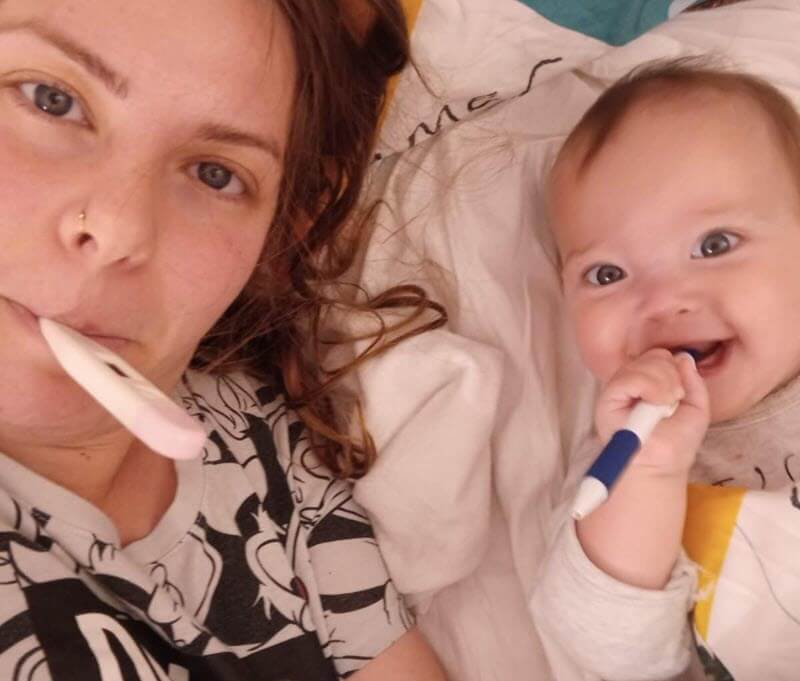While most breastfeeding moms plan to postpone pregnancy during breastfeeding, a growing number of older breastfeeding moms, approaching or already in their forties, actually want to conceive again ASAP. They hope their fertility returns when breastfeeding decreases, during prolonged weaning, or once menstruation resumes. This is often wishful thinking. If you are in this situation, and feeling stressed about your biological clock ticking, this guide is for you.
Do I have to stop breastfeeding to get pregnant?
This is the thorniest issue for many. Assuming your fertility status was good before your last pregnancy, the question raises a conflict that many older breastfeeding moms experience. On one hand, they are committed to breastfeeding and want to nurse their infant or toddler for as long as possible. At the same time, they also yearn to be pregnant with their next child.
There is no easy formula for solving this dilemma, particularly if you haven’t started menstruating yet. If you really want to get pregnant as soon as possible, it is best to think about how to reduce breastfeeding during the day and particularly at night, and develop a realistic plan to wean your baby.
Taking your baby off the breast requires diligent planning and patience; it could take many months to achieve and may not move forward as planned, because your baby’s needs may not be in sync with your own.

How soon can I get pregnant after breastfeeding?
Just because your cycles seem like they are “back to normal” and “regular”- does not mean you are actually ovulating or that your cycle is hormonally balanced. This is a common yet inaccurate assumption that breast feeders make.
If you’re in the process of weaning your baby and you intend to achieve another pregnancy, you want to ask yourself the following questions:
- Did your last pregnancy occur naturally?
- Were you close to or past 40 when you gave birth to your last child?
- Did it take more than 3-6 months to conceive last time?
- Do you have a history of irregular cycles, nutritional deficiencies (anemia, iron, B12) or a known hormonal imbalance like PCOS?
- Do you already have a period and you’ve been trying to get pregnant for six months or more (without success)?
If you answered “yes” to most or all of these questions, here are some things you can do to move forward towards reaching your goal.
Steps to achieving pregnancy during and after breastfeeding
- Develop a plan for weaning your child. Give yourself at least 2-3 months. If you are not sure how to do this, consult with an experienced breastfeeding counselor.
- Learn fertility awareness! This is the best tool for monitoring your fertility status in real time. When you know how to “read your body,” by observing and interpreting your natural secretions and basal body temperature, you can know on a daily basis, if and when your fertility is returning, even before a first period, and if you are even ovulating. A certified teacher who has experience with breastfeeding transitions can help you interpret your charts and give you practical guidance for increasing your fertility and chances of pregnancy.
- If you’re breastfeeding and not getting more than 3 hours of continuous sleep, your basal body temperature may not be so accurate. A good solution in this case would be Temprop, a wearable device that measures your temperature while you sleep.
- If and when you can identify your fertile days, with or without regular cycles, you can know on what days pregnancy is possible. If you’re not pregnant after 3 cycles, a number of diagnostic tests can provide more information.
Recommended Diagnostic Tests
- Check your prolactin levels. Prolactin (PRL) is one of the two primary breastfeeding hormones responsible for milk production. Believe it or not, PRL levels can remain surprisingly high, even when breastfeeding is reduced to a minimum or stopped altogether. PRL levels can be reduced by taking a drug or herb for short-term use. Acupuncture and Chinese herbs are also effective.
- If your cycles are regular, ask your gynecologist or practitioner for a referral for ultrasound follow-up during the days you assume you are fertile. This can show if there is a dominant follicle developing in the ovary and its size (which reaches approximately 20 X 20 mm near ovulation). Ultrasound can also measure the thickness of the uterine lining for that time of the month.
- If you are minimally breastfeeding, cycling and not getting pregnant, you can have your cycle/fertility hormones checked (FSH, LH, Estrogen, Progesterone). This involves a simple blood test performed on Day 2-3 of the cycle.
- Include your thyroid hormones (TSH, T3,T4) because they can change as we age. Most cases of thyroid imbalance are known as hypothyroidism and are often detected during the peri-menopause (in our forties).
- If you have a history of anemia or nutritional deficiencies or have a restrictive diet (vegetarian, vegan, other), check your nutritional status. This includes blood testing for vitamin B12, iron, ferritin, folate, hemoglobin, calcium, zinc, vitamin D and total protein. This can be done at the same time as the hormonal and thyroid tests.
- If you are in your forties, you will want to check your ovarian reserve. While we are born with all the eggs we will ever need, our eggs age as we get older and this affects their quality. Our fertility potential declines after age 35 and that decline is accelerated after the age of 40.
- The two recommended tests for ovarian reserve are AMH (anti mullerian hormone) and AFC (antral follicle count). AMH is the hormone secreted by the immature (antral) follicles in your ovaries and can be measured in a blood test any time during the menstrual cycle. AFC is measured by vaginal ultrasound on day 3 of the cycle. AFC identifies the number of antral follicles in your ovaries in real-time. These follicles have the highest potential of producing FSH and developing into a dominant follicle at the time of ovulation.
- If you have a male partner who is in their forties or older, they should perform a sperm analysis. Male fertility and sperm quality decline with age and many men can be diagnosed with secondary infertility, which means they were able to have children in the past and now there is a problem. There are many natural approaches to improving male fertility. You can read about them here.
If you discover any problems or imbalances in the diagnostic process, consult your preferred health practitioner, naturopath or fertility awareness educator. We cannot take our fertility for granted so it’s best to take initiative and investigate your situation ASAP.
Wishing you optimal health and best of luck on your pregnancy journey. Remember to reach out early to those who can guide and support you if you don’t see results.


One Response
Thanks for sharing valuable insights on getting pregnant while breastfeeding! Considering the complexities, have you come across any unexpected challenges or tips that you found particularly helpful during this journey?